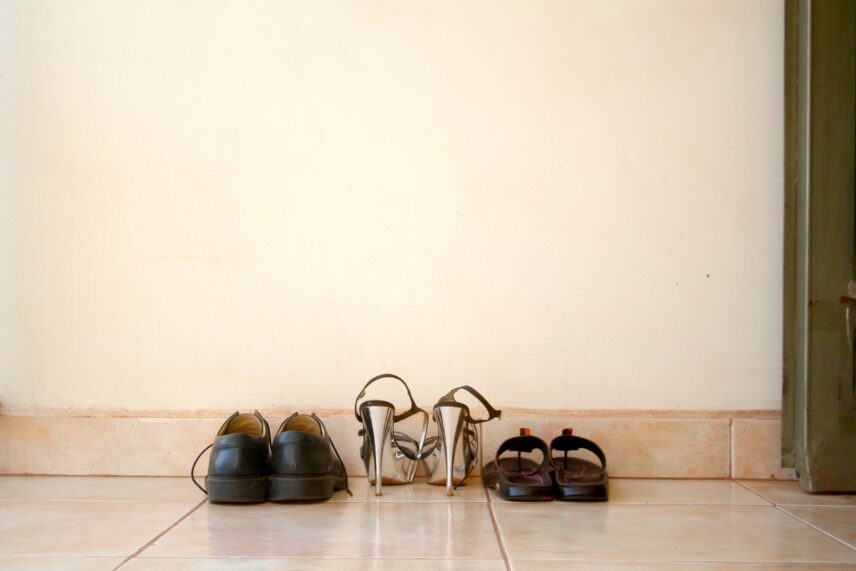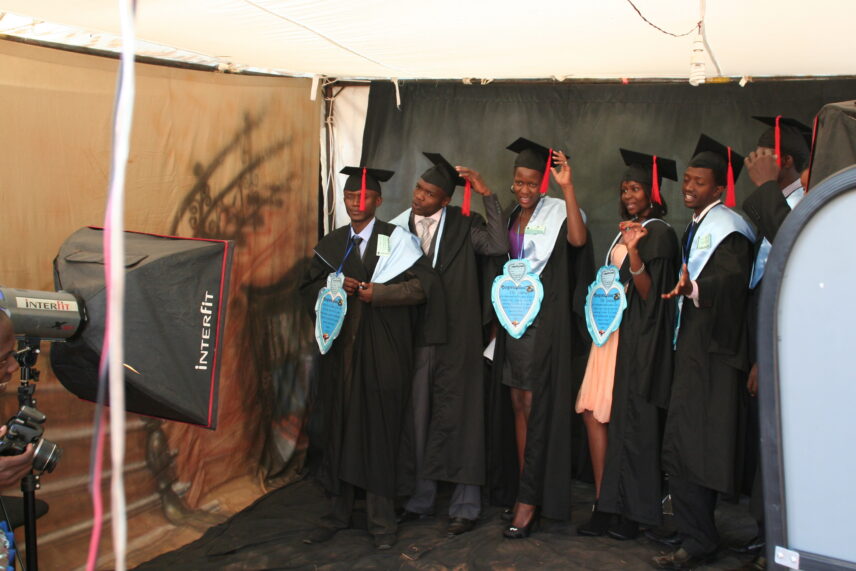Article begins
A new generation of East African women come of age through the crucible of sexual economy at Makerere University in Kampala, Uganda.
This article is based on Brooke Bocast’s book, If Books Fail, Try Beauty: Educated Womanhood in the New East Africa, which won the 2023 Council on Anthropology and Education (CAE) Outstanding Book Award. Find out more about the annual CAE book award and the nomination process on the CAE website.
“Milly is smart in her game. Sometimes I used to ask her ‘Did you go to school for this?’” Lucy laughs as she reflects on her friend Milly’s participation in Kampala’s sexual economy wherein female students exchange sexual favors for money, grades, and luxury commodities. Between 2010 and 2014, when I conducted ethnographic fieldwork at Makerere University, Milly parlayed multiple “boyfriend” relationships into thousands of dollars’ worth of clothes, shoes, electronics, high-end alcohol, academic grades, a house, and ultimately, a white-collar job in her chosen field. She also experienced domestic violence, engaged in unprotected sex with partners of unknown HIV status, and earned a reputation as a “crazy bitch.”
Like many other university women engaged in “transactional sex,” Milly is a member of Uganda’s nascent urban middle class and a student at East Africa’s most prestigious university. Her sexual activities point to a central paradox in the lives of many young, educated East African women: they are financially stable and eminently knowledgeable, yet engage in practices that put them at risk of unwanted pregnancy, public admonishment, and sexually transmitted infections. While Milly did not “go to school” to learn the craft of “playing” men, I illustrate how the process of higher education in urban Uganda fosters the sexual economy that Milly and Lucy so excel at.
If Books Fail, Try Beauty accompanies female students at Makerere University in Kampala, Uganda, as they navigate campus life in the wake of dramatic and contested gender-based education reform. This is an ethnography of a group of friends who traveled from across East Africa (Tanzania, Rwanda, Kenya, South Sudan, and Uganda) in pursuit of higher education and, I argue, class advancement. I explore the aspirations, dilemmas, and everyday lives of female students who participate in what public health professionals refer to as “the sexual network” and what young women call “the game.”

In the book, I seek to uncover the stakes of participation in Makerere’s sexual economy. How does “transactional” sex—a woefully inadequate term for women’s embodied experiences—articulate with students’ strategies for gaining financial capital and social status? By what logics do young women reckon risk and value within a panoply of social relations? What connections do they draw between university life and their imagined or desired futures? How do they subvert and reshape gendered ideals of moral personhood? Because African women have historically relied on their bodies as a productive resource, and because sex is a potent site for the articulation of social anxieties, Makerere’s sexual economy provides a powerful lens onto social change and reproduction in East Africa’s “neoliberal success story.”
Observers link the rise of sexual economy at Makerere University, and the emergence of a “commodities race” among students, to Uganda’s neoliberal turn in the late twentieth century. President Museveni—intent on stabilizing the country’s institutions following decades of post-independence unrest—partnered with the World Bank to overhaul Uganda’s economy. Museveni instituted the classic “DLP” neoliberal policy suite: Deregulation of the economy, Liberalization of markets, and Privatization of state-owned enterprises. During my fieldwork in 2010, Uganda ratified the East African Community (EAC) Common Market Protocol, which further accelerated the region’s march towards global free market capitalism.
The effects of these reforms are sweeping and pervasive. University students face a newly privatized higher education sector, an influx of international commodities, and a burgeoning media landscape no longer dominated by government programming. Female students in particular grapple with Uganda’s paradoxical inclusion in—and exclusion from—global markets. For example, satellite television streams Western advertisements, primarily aimed at women, straight to students’ hostel rooms, but the shops around campus stock faulty Chinese knockoffs. Africanist anthropologists stress the “gap” between young people’s commodity desires and class aspirations, and the material and structural limitations that shape their everyday lives. Burdened by the gap, female students sense that the financial capital they command by virtue of their family backgrounds, as well as the rewards they reap from various suitors, are, as Milly once insisted, “never enough.”
The book is also a tale of an institution—Makerere University— albeit from a particular vantage point. Established in 1922, Makerere soon became East Africa’s leading university, and a source of national pride. For decades, Makerere provided rigorous public education to elite men, earning it the nickname “Harvard of Africa.” When Museveni privatized higher education in the early 1990s, Makerere underwent a profound transformation. From 1990 to 2004, enrollment increased from four thousand to forty thousand students. In line with the United Nations’ Millennium Development Goals (now called Sustainable Development Goals), Museveni instituted an affirmative action policy that doubled the percentage of female students, from 25 to 50 percent of the student body. The World Bank hailed this “democratization” of higher education as a model for countries across Africa, and beyond.
Makerere’s infrastructure has not kept pace with ballooning enrolments, nor has the institution recovered from the withdrawal of state funding. The university suffers from inadequate facilities, overworked and underpaid faculty, and disorganized administration. A 2005 Washington Post headline captures Makerere’s decline: “Underfunded and Overrun, ‘Harvard of Africa’ Struggles to Teach”. How do students cope with attendance at a university that is regarded as the pinnacle of academic achievement in East Africa, but that fails to deliver basic student services? How do students construe the value of university education, in general, and a Makerere education in particular? What do changes at Makerere mean for higher education throughout East Africa, and globally? After all, as Ugandans are fond of saying, “When Makerere coughs, all the universities catch cold.”
Makerere University exemplifies the contradictions that define Uganda’s economic rise over the past several decades. The university campus sits amongst poverty-stricken neighborhoods where newly constructed student hostels (privately run student dormitories) tower over warrens of tin shacks. Makerere’s student body largely comprises youth from Uganda’s two most prosperous regions (Central and Western). Many students, including international students from surrounding countries, attend elite secondary boarding schools in Kampala prior to matriculating at Makerere. Students are frequent targets of robberies and assaults when walking to and from campus; they also fall prey to witchcraft intended to relieve them of their money and consumer electronics. To residents of Kampala’s sprawling urban slums, university students represent the nouveau—and potentially undeserving—elite.

Finally, the book is, in some ways, the story of a generation. The lives of the young women in its pages differ dramatically from those of their mothers in terms of their access to education and employment, their urban sensibilities and transnational aspirations, and their freedom to engage in romantic and sexual liaisons outside the strictures of rural kin. Because of this generational rupture, parents tend to be unfamiliar with university norms. Students take advantage of their families’ ignorance to fabricate new worlds in the open space of campus life. Makerere students find themselves at the forefront of a reformulated pan-East African educated class, bolstered by their parents’ resources and unburdened by family supervision.
The text presents the first ethnography of university students in sub-Saharan Africa, and it joins an emerging ethnographic literature of middle-class lifeways on the continent. If Books Fail, Try Beauty contributes to three overlapping bodies of anthropological scholarship. First, I examine East African “middle classness” as a designation in the making that is both regionally specific and globally resonant. In doing so, I also situate transactional sex within broader considerations of value transformation and social mobility. Finally, I focus on young women’s efforts to embody and reconfigure ekitiibwa—a Luganda term that approximates gendered ideals of moral personhood. These efforts signal Makerere University’s continued significance as a locus of social change. If Books Fail, Try Beauty brings together formerly disparate conversations about education, sexuality, and state policy to offer a theorization of emerging forms of selfhood in the postcolony.
In this time of profound uncertainty, Millie and her friends forge new ways of being in the world. They start small businesses and volunteer for humanitarian causes. They cram for final exams. They spend entire days watching music videos in their dormitory rooms. They follow national politics and vote in elections. They bicker and reconcile with friends, lovers, and family members. They attend church and disavow church, often in the same week. Throughout, they reshape the meaning of “educated,” wrestle with the embodiment of ekitiibwa, and chart new life course paths in an emerging neoliberal market society. Their stories engender East African futures.
Tricia Niesz is the section contributing editor for the Council on Anthropology and Education.

